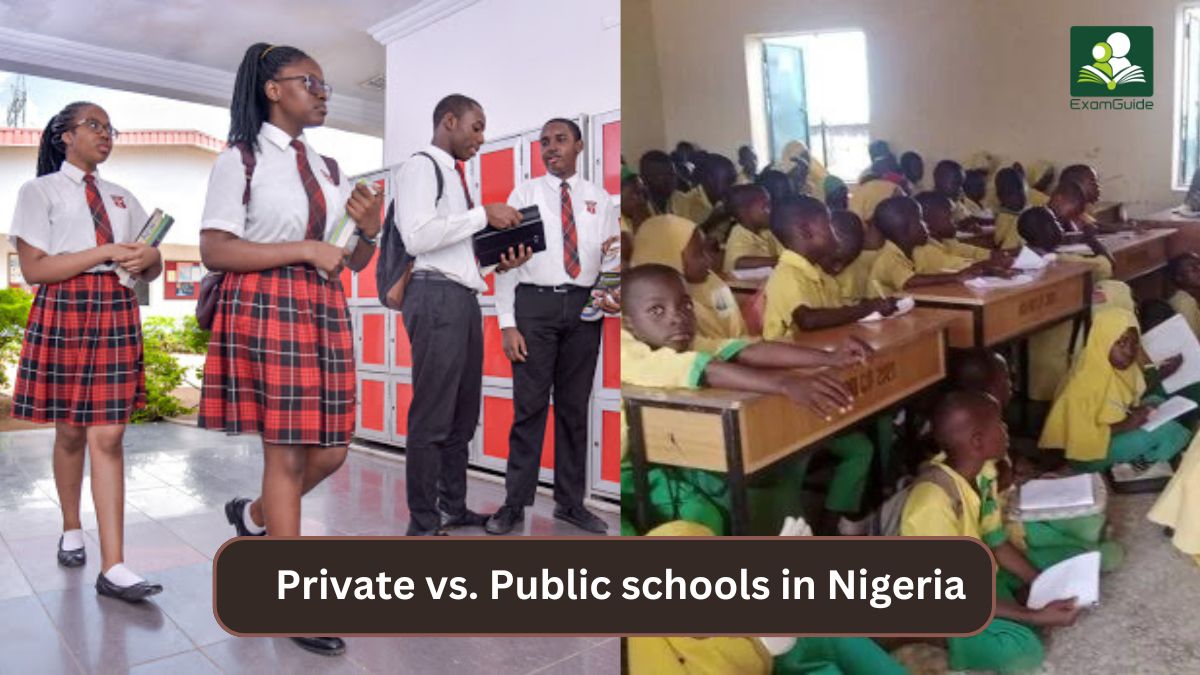
Private vs. Public schools in Nigeria
Education is a vital tool for national development, and the choice of schooling plays a key role in shaping the future of students. In Nigeria, parents and guardians are often faced with the decision of enrolling their children in either private or public schools at both the primary and secondary levels.
These schools cater to children, providing foundational education and preparing them for national exams such as the West African Senior School Certificate Examination (WASSCE).
Private and public schools offer distinct advantages and challenges, making it crucial to understand their differences, strengths, and limitations. This article will explore the key factors that differentiate private and public schools in Nigeria
Table of Content
What are the Key Differences Between Private and Public Schools in Nigeria?
Why are Private Schools More Expensive than Public Schools?
Do Private Schools Produce Better Academic Results than Public Schools?
Are Private Schools Available in Rural Areas of Nigeria?
How Do I Choose Between a Private and Public School for my Child?
How do Private and Public Schools Prepare Students for Future Careers?
What is a Private School?
A private school is an educational institution that is independently funded and managed, typically through tuition fees paid by students’ families. Unlike public schools, which are funded by the government, private schools operate under private ownership and may have more flexibility in their curriculum, teaching methods, and administrative decisions.
Private schools often offer smaller class sizes, better infrastructure, and a diverse range of extracurricular activities. Some private schools follow international curricula, such as the British or American systems, in addition to the national curriculum. However, they are generally more expensive, which can limit access to families who can afford the higher tuition fees.
What is a Public School?
A public school is an educational institution that is funded and managed by the government, whether at the local, state, or federal level. Public schools are typically more affordable or even free for students, as they receive financial support from the government.
They follow a standardized curriculum set by the education authorities and aim to provide education to all children, regardless of their socioeconomic background.
In Nigeria, public schools often face challenges such as overcrowded classrooms, inadequate infrastructure, and limited resources. However, they remain accessible to a broader population, particularly in rural areas, and play a crucial role in providing education to the majority of the country's students.
What are the Key Differences Between Private and Public Schools in Nigeria?
1. Funding and Management
One of the most significant distinctions between private and public schools in Nigeria is their source of funding.
- Public Schools: Public schools are government-funded and managed by local, state, or federal governments. This allows them to offer lower tuition or free education, especially at the primary and secondary levels. However, the reliance on government budgets often means that public schools suffer from underfunding, leading to poor infrastructure, overcrowded classrooms, and limited access to learning materials.
- Private Schools: Private schools are funded through tuition fees paid by parents and sometimes through donations from private individuals or organizations. As a result, they typically have more financial resources to invest in infrastructure, modern teaching materials, and extracurricular activities. The management of private schools is also often more flexible and responsive to the needs of students and parents.
2. Infrastructure and Facilities
Infrastructure plays a critical role in providing a conducive learning environment, and this is another area where private and public schools differ significantly.
- Public Schools: Public schools, particularly those in rural areas, often face infrastructure challenges. Many government schools lack adequate classroom space, functional libraries, science laboratories, or modern technology. In some cases, students learn in makeshift classrooms or overcrowded halls, which negatively impacts the learning experience.
- Private Schools: Private schools generally have better infrastructure, including well-equipped classrooms, laboratories, libraries, and modern learning technologies. Many private institutions also offer enhanced facilities like computer labs, sports complexes, and music or art studios, contributing to a well-rounded education. However, these facilities often come at a cost, making private education more expensive.
3. Curriculum and Academic Rigor
The curriculum used by private and public schools is another factor parents consider when choosing an institution for their children.
- Public Schools: Public schools in Nigeria follow a standardized curriculum set by the government, focusing on core subjects like Mathematics, English, Science, and Social Studies. While this curriculum ensures consistency across the country, it may not always adapt quickly to global trends or provide advanced learning in specialized subjects. Additionally, public schools may struggle to keep up with evolving educational technologies.
- Private Schools: Private schools often have the flexibility to offer a broader and more diverse curriculum. In many cases, private institutions combine the Nigerian curriculum with international curricula such as the British or American systems. This allows students to receive a more globalized education, preparing them for international opportunities. The flexibility in teaching methods also allows private schools to emphasize critical thinking, problem-solving, and creativity.
4. Teacher Quality and Training
Teachers are the backbone of any educational institution, and the quality of teaching in private and public schools varies significantly.
- Public Schools: In public schools, teacher recruitment is often conducted by the government, with strict criteria for qualifications. However, due to low salaries and poor working conditions, many public school teachers lack motivation. Teacher absenteeism is also a common problem in some public institutions. While some public schools have highly qualified and experienced teachers, the lack of continuous professional development and training programs can affect the overall teaching quality.
- Private Schools: Private schools generally attract more motivated teachers due to higher salaries, better working conditions, and professional development opportunities. Many private schools invest in regular training for their teachers to ensure they stay updated on modern teaching techniques and methodologies. This results in a more engaging and dynamic classroom experience for students. However, not all private schools maintain high standards in teacher recruitment, so the quality can vary depending on the institution.
5. Student Performance and Outcomes
Student performance is often used as a benchmark to compare private and public schools.
- Public Schools: Due to overcrowded classrooms, limited resources, and inconsistent teacher quality, students in public schools often perform below expectations, especially in standardized exams like the West African Senior School Certificate Examination (WASSCE). However, there are exceptions, as some government schools, particularly in urban areas, achieve high academic standards and produce excellent results.
- Private Schools: Private schools are known for producing better results in national and international examinations. The emphasis on small class sizes, personalized learning, and a rigorous academic structure allows students to excel academically. Private schools also tend to prepare students for life beyond secondary education, with many offering career guidance and international exposure.
6. Cost of Education
The cost of education is another major factor differentiating private and public schools.
- Public Schools: Public schools are either free or charge minimal fees, making them accessible to the majority of Nigerian children. This is particularly important for families with low incomes. However, despite the low cost, the quality of education in some public schools can be compromised due to a lack of resources.
- Private Schools: The high cost of tuition in private schools is often a barrier for many Nigerian families. While private education may offer better infrastructure, teaching quality, and academic outcomes, it remains a privilege for the few who can afford it. Some private schools offer scholarships or financial aid, but these opportunities are limited.
7. Access to Education
In terms of access, public and private schools differ in their reach.
- Public Schools: Public schools are more widespread and accessible, particularly in rural areas where private schools may not be present. The government’s effort to provide free or subsidized education ensures that more children, especially those from low-income families, have access to schooling. However, due to overcrowding, the quality of education may suffer.
- Private Schools: Private schools are predominantly located in urban and semi-urban areas, limiting access for students in rural regions. While they offer superior quality education, the high cost and limited availability make them less accessible to the average Nigerian child.
8. Extracurricular Activities and Development
Extracurricular activities play an essential role in a child's development outside the classroom.
- Public Schools: Due to limited resources, many public schools struggle to provide a wide range of extracurricular activities. However, students in public schools may still participate in sports and cultural activities organized at the community or state level.
- Private Schools: Private schools place a strong emphasis on holistic development, offering a variety of extracurricular activities such as sports, music, arts, and drama. These activities help students develop leadership, teamwork, and communication skills, contributing to their overall personal development.
Why are Private Schools More Expensive than Public Schools?
Private schools rely on tuition fees to fund their operations, including maintaining modern facilities, hiring highly qualified teachers, and offering extracurricular programs. Public schools, on the other hand, are subsidized by the government, making them more affordable or free, but often with fewer resources.
Do Private Schools Produce Better Academic Results than Public Schools?
Yes, private schools in Nigeria generally produce better academic results than public schools. This is often due to smaller class sizes, better resources, higher teacher quality, and a more rigorous academic structure. However, this can vary depending on the specific school and location.
Are Private Schools Available in Rural Areas of Nigeria?
Private schools are less common in rural areas of Nigeria compared to urban regions. While some private schools do exist in rural areas, they are fewer in number due to lower demand and affordability challenges. Public schools are more widely available in rural regions, offering accessible education to the local population.
How Do I Choose Between a Private and Public School for my Child?
To choose between a private and public school for your child, consider the following factors:
- Budget: Private schools are more expensive due to tuition fees, while public schools are typically free or charge minimal fees.
- Quality of Education: Private schools often offer smaller class sizes, personalized teaching, and better resources, while public schools may struggle with overcrowded classrooms and limited facilities.
- Location: Consider the proximity of the school to your home. Public schools are more common in rural areas, while private schools are concentrated in urban regions.
- Curriculum: Private schools may offer a more diverse or international curriculum, while public schools follow the national curriculum.
- Extracurricular Activities: Private schools usually provide more extracurricular options like sports, arts, and technology-based activities.
- Student Needs: Consider your child’s learning style, educational goals, and any special needs they may have.
Weigh these factors according to your child’s specific needs and your family's circumstances to make the best decision.
How do Private and Public Schools Prepare Students for Future Careers?
Private and public schools prepare students for future careers in different ways:
Private Schools:
- Career Guidance: Many private schools offer comprehensive career counselling services to help students identify their strengths, interests, and potential career paths.
- Global Exposure: Some private schools provide international curricula or partnerships, preparing students for global opportunities.
- Skills Development: Private schools often emphasize extracurricular activities, leadership training, and hands-on experiences that enhance critical thinking, communication, and problem-solving skills.
- Higher Education Preparation: With a focus on academics and personalized attention, private schools often prepare students well for higher education, both locally and abroad.
Public Schools:
- Foundational Education: Public schools focus on providing a solid foundation in key academic subjects, preparing students for national exams like WASSCE, which are essential for university admission.
- Community Integration: Public schools prepare students for careers within local industries and government roles by emphasizing national curricula and local socio-economic realities.
- Basic Skills: Although limited in resources, public schools aim to equip students with basic academic and life skills that are essential for entering the workforce or pursuing higher education.
In summary, while private schools may offer broader exposure and personalized career guidance, public schools provide essential academic preparation, especially for local career paths.
Conclusion
The choice between private and public schools in Nigeria ultimately depends on a variety of factors, including financial capability, location, and educational goals. Private schools generally offer better infrastructure, personalized teaching, and higher academic outcomes, but at a much higher cost.
Public schools, on the other hand, provide more affordable education, making them accessible to a larger population, though they often face challenges in terms of resources and quality.
Parents and guardians must weigh these factors carefully when making decisions about their children’s education, considering both short-term benefits and long-term outcomes. Regardless of the type of school chosen, the ultimate goal is to provide a quality education that prepares students for the future.
No comment found
Related Posts

Steps to Take If You Want to Study Abroad After Secondary School

Building Confidence as a Student: Tips for Speaking Up in Class

How to Use YouTube as a Learning Tool for WAEC and JAMB Preparation

How to Set Academic Goals and Achieve Them

Top High-Demand Careers for Nigerian Students in the Next 10 Years


